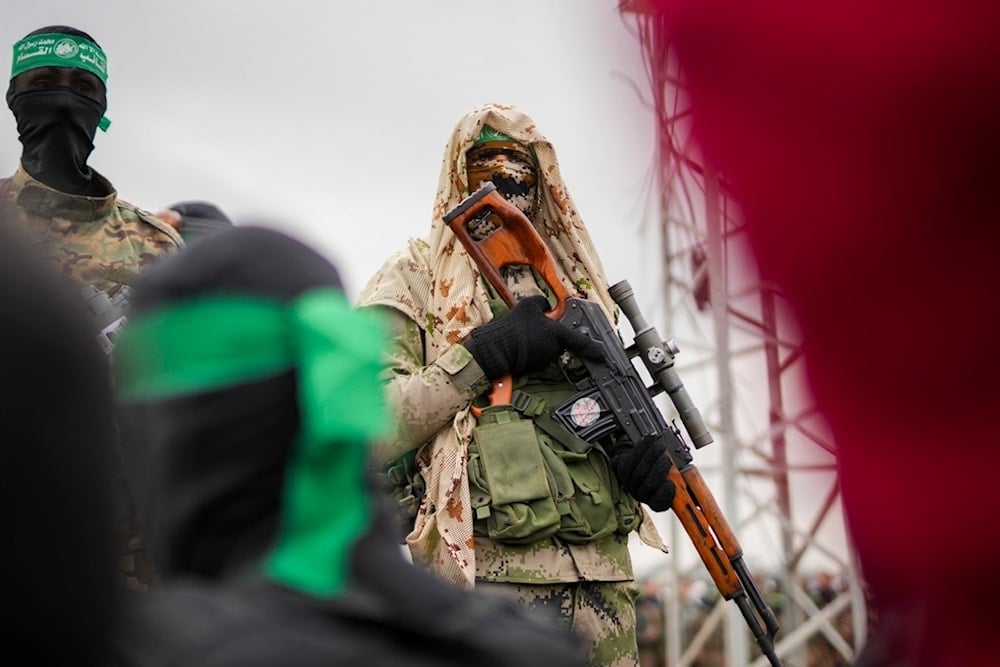Hamas responds to Trump plan, backs Gaza withdrawal, exchange
Hamas agrees to prisoner exchange and Gaza withdrawal under Trump plan, while stressing that core Palestinian rights need national consensus and UN backing.
-

A Hamas fighter in combat fatigues stands before the ceremony for the handover of Israeli captives to the Red Cross in Nuseirat, central Gaza Strip, Saturday, February 22, 2025 (AP)
The Palestinian resistance movement Hamas announced on Friday that it had delivered its official response to the Gaza plan proposed by US President Donald Trump, following extensive consultations with its leadership bodies, other Palestinian factions, and international mediators.
In its statement, Hamas said it appreciated Arab, Islamic, and international efforts, including those of President Trump, aimed at halting the war on Gaza, ensuring the entry of humanitarian aid, preventing the displacement of Palestinians, and rejecting the occupation of the Strip.
The movement declared its approval of a framework for a prisoner exchange deal, agreeing to release all Israeli captives, both living and deceased, in line with the formula proposed by Trump, once conditions on the ground permit the process. Hamas confirmed its readiness to immediately enter negotiations through mediators to finalize the details.
Handover of Gaza administration
Hamas also reiterated its acceptance of handing over the administration of Gaza to a Palestinian technocratic authority made up of independents, based on national consensus and supported by Arab and Islamic backing.
The group emphasized that other aspects of Trump’s proposal concerning the long-term future of Gaza and the fundamental rights of the Palestinian people are issues that require a broader national decision.
Hamas stressed that such matters must be discussed within a unified Palestinian framework, with adherence to international law and UN resolutions.
“Hamas will be part of this national process and will contribute to it responsibly,” the statement concluded.
Trump issues ultimatum
Trump issued an ultimatum to Hamas, giving the Palestinian resistance group until 6:00 p.m. Washington time on Sunday to accept his newly unveiled so-called Gaza "peace" proposal, warning that "all hell" will break loose if it refuses.
The threat, delivered amid ongoing US-Israeli coordination, has been widely condemned by analysts and human rights advocates as coercive diplomacy designed to entrench Washington's political agenda rather than achieve genuine peace.
White House Press Secretary Karoline Leavitt reinforced the president's tone during a Friday briefing, framing the offer as a "final opportunity" for Hamas to avoid annihilation. "Hamas has an opportunity to accept this plan and to move forward in a peaceful and prosperous manner in the region. And if they don't, the consequences, unfortunately, are going to be very tragic," she said.
A Plan Backed by 'Israel' and Built Around US Control
Unveiled last week in tandem with Israeli Prime Minister Benjamin Netanyahu, Trump's 20-point proposal presents Gaza's future as contingent upon Hamas's disarmament, the return of Israeli captives, and the establishment of a foreign-supervised administration. The plan envisions Gaza being transformed into a "demilitarized zone free of threats", overseen by a newly created international "Peace Council" chaired by Trump himself and including figures such as former British Prime Minister Tony Blair, whose legacy is tied to the Iraq and Afghanistan wars.
The proposal promises a comprehensive reconstruction program under Western and Gulf sponsorship, conditional on the complete dismantling of the Resistance's military infrastructure. It also claims to offer amnesty to Hamas members who agree to "coexistence" and renounce arms, while allowing others to leave Gaza through "safe corridors" to countries willing to receive them, a clause critics say amounts to forced expulsion.
Under the plan, Gaza's administration would shift to a non-political technocratic committee, operating under the Peace Council's supervision. A temporary international stabilization force, made up of US, Egyptian, Jordanian, and Palestinian police contingents, would be deployed to "secure borders" and manage the enclave's internal security.

 4 Min Read
4 Min Read









